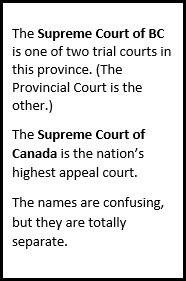Links to help & information on criminal cases
Picklists - Standardized wording for bail & sentence orders
This page provides general information about the BC Provincial Court’s criminal law work.
• Find information on sentencing.

Under the Criminal Code of Canada, Provincial Court judges can conduct trials of all criminal matters except adults charged with murder and a few rare offences such as treason, piracy and inciting mutiny. In criminal cases:
• Provincial Court judges conduct preliminary hearings and trials when an accused person pleads not guilty, and
• Provincial Court judges sentence people who plead guilty or who are found guilty at a trial.

While the Criminal Code requires that some offences (including less serious “summary conviction offences”) be tried in Provincial Court, it gives people charged with many more serious offences (“indictable offences”) the choice whether to have their trial in Provincial Court or in the Supreme Court of BC. If they choose (“elect”) the Supreme Court of BC they also choose whether to be tried there by a judge alone or a judge and jury. All jury trials take place in the Supreme Court of BC.
If an accused person chooses to be tried in the Supreme Court of BC, either they or the Crown prosecutor may request that a preliminary hearing (also called a “preliminary inquiry”) be held in Provincial Court. At the end of a preliminary hearing a Provincial Court judge does not decide on guilt, but only on whether there is sufficient evidence to send (“commit”) the accused to stand trial in the Supreme Court of BC.
Laws
Two federal statutes apply to most criminal matters before the Court:
• The Controlled Drugs and Substances Act - contains criminal offences specific to illegal drugs and the substances used to produce them
Specialized courts
In efforts to better meet the needs of First Nations communities and mentally disordered and substance addicted offenders, the Provincial Court has established a number of innovative specialized courts around the province.
Trial Scheduling
The Court works hard to schedule trials without undue delay, but this is a constant challenge. For information on current initiatives designed to manage the Court’s case flow, see
Provincial Court Scheduling and Practice Directions issued by the Chief Judge.
Some court proceedings may be conducted by telephone or videoconference using the Microsoft Teams platform. Current information on how different types of proceedings are being conducted can be found in Practice Directions and Notices to the Profession and the Public issued by the Chief Judge. Find guidance on how to appear remotely in a virtual conference or hearing at Attending Remotely.
More Information
This website provides general information only and should not be used as legal advice.
Updated September 2021

